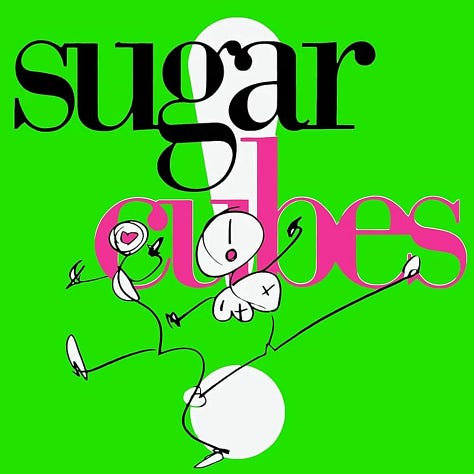


Life's Too Good, The Sugarcubes (Elektra)
Boston Phoenix, August 5, 1988
Bjork turns 59 on November 21st, and it’s curious to look back at the early impressions she made with the Sugarcubes. Before breaking through as a crossover experimentalist in her swan dress, she scanned mostly quirky. That whole debut album campaign wreaked flavor-of-the-month as the international pop punditry descended on Reykjavík. Yoko Ono smiles...
THE SIX TO EIGHT months of unending darkness that descend during near-arctic winters can do funny things to your head way up in Iceland. Especially, one presumes, if you are a bunch of brooding rock experimentalists itching to plug into pop, like the Sugarcubes, a quintet who go by their pithy first names. "Birthday," the single from their American debut, Life's Too Good, has an otherworldly primitivism: guitars that sound more jagged than jangling collide amid brittle, angular rhythms that make a provocative enough counterpoint to lead vocalist Björk Guðmundsdóttir's unpredictable squawks and trills. Life's Too Good offers an eccentric new wrinkle under the sun, but the Sugarcubes are a disappointment live. Maybe it was just their cold-blooded reaction to the heat wave—like football players who come up gasping for oxygen in Denver's Mile High Stadium—but their recent Axis show was an anticlimax, Björk's rapt and vigorous wails notwithstanding. Björk isn't the only mannerist to make this band sound at once foreign and familiar.
The Sugarcubes shuffle their pack of musical references—the textural sprawl of U2, the savvy snarl of the Pretenders—into quirky configurations, inscrutably danceable. Songs like "Traitor" and "Delicious Demon" shift gears in sudden, disorienting ways; Siggi Baldursson's drums catapult from one speaker to the other; second lead vocalist Einar Örn's harmonica sounds oddly remote; and Björk's voice is double- and triple-tracked for strange and often chilling dialogues with herself. Örn doesn't sing so much as inject distant commentary, like the Big Brother radio voice-over in "Motocrash." In "Birthday," Björk's cat-calling "dum, dum, dumma dumma dum-dum" expresses what her lyrics only sketch: "She's painting huge books, glues them together/There was a big raven it glided down the sky/She touched it."
The moment is so round with pleasure that the twist of the number doesn't take hold until you realize they're denouncing the ecstasy they're busy creating.
The Sugarcubes write their songs in Icelandic and then translate them into English for the outside market. This ensures a certain poetic havoc, emphasizing minimalist imagery and odd inflections (especially from Örn). But when they lay bare an introspective vein, they burrow into it quickly, as when Björk careers toward the end of the refrain on the line "Tis joy won't last" in their best jab at success, "Blue-Eyed Pop." The moment is so round with pleasure that the twist of the number doesn't take hold until you realize they're denouncing the ecstasy they're busy creating.
At Axis, you could see why her publicists hope to turn Björk into this week's diva-complex of fashion and mystique, the best cheekbones in Reykjavík ready to take on the world. "Why aren't you all at the baseball game?" she kept asking her befuddled listeners. Her hair springs from her head in unmanageable fury, and since she has the most hair in the band (the guys sport mostly crewcuts), it's like an exclamation point atop the words she squeals. With drums off to the left and muffled keyboards to the right, Björk and Örn held center stage, with his strict and heated exhortations countering her impulsive flights. But muddied mix or no, the Sugarcubes held their audience by exertion, not the murky and elusive angst they dote on in Life's Too Good.
Without the meticulous production of R. Shulman and D. Birkett, the material tended to sound the same, and as usual with the Axis sound system, lyrics were lost completely. The yen for communal dance redemption they celebrate and ridicule in "Blue-Eyed Pop" notwithstanding, few songs left you convinced that "something wonderful is about to happen" with Björk and the boys, that from out of left field a Nordic band smitten by Western sounds is going to change the way we listen to pop. As enticing as that notion is, the Sugarcubes are not enough sweetener to make it work.
movie of the month
Alex Garland’s Civil War came out earlier this year, but in this post-election hangover it feels both further away and much too close. Kristen Dunst plays Lee, a weary war photographer who barely makes it to the White House for the Big Money shot. Cailee Spaeny plays Jesse, the young turk who adopts Lee as a mentor and learns from her a little too well. Spaeny proved nuanced, fierce, and funny in Adrian Avila’s Alien: Rubicon, and she’s tremendous here, as if her acting itself makes Dunst wary. Jesse Plemons turns up (uncredited) as a psycho in pink sunglasses, eradicating any last trace of innocence.
noises off
Over 30 vengeful, exasperated, and triumphal versions of Dylan’s “Most Likely You Go Your Way and I’ll Go Mine” soundtrack the Nixon implosion on the new 1974 Live Recordings box (27 discs). Now on heavy rotation for you-know-what. Coming soon to the Los Angeles Review of Books.
Randy Newman’s biography from the Los Angeles Review of Books.
more clips, obituaries, critical links, and research resources at the riley rock index; also beacons.ai, and one final random deep link to keep you guessing.





